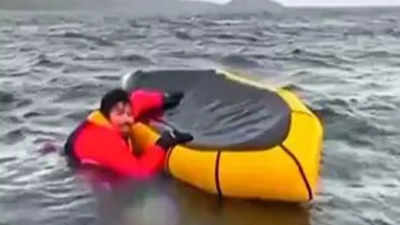PUNTA ARENAS (CHILE): A huge humpback whale briefly swallowed a kayaker off Chilean Patagonia before quickly releasing him unharmed. The incident, caught on camera, is viral.
Last Saturday, Adrian Simancas, 24, was kayaking with his father, Dell, in Bahia El Aguila near the San Isidro Lighthouse in the Strait of Magellan when a humpback whale surfaced, engulfing Adrian and his yellow kayak for a few seconds before letting him go.
Dell, just metres away, captured the moment on video while encouraging his son to stay calm. “Stay calm, stay calm,” he can be heard saying after his son was released.
“I thought I was dead,” Adrian told AP. “I thought it had eaten me, that it had swallowed me.” He described the “terror” of those few seconds and explained his real fear set in only after resurfacing, fearing the whale would hurt his father or that he would perish in the frigid waters. “When I turned, I felt something blue and white passing close to my face, like on one side and above. I didn’t understand what was happening. Then… I went under and thought I had been swallowed.”
“When I came up and started floating, I was scared something might happen to my father too, that we wouldn’t reach the shore in time, or I would get hypothermia,” Adrian said. After a few seconds, Adrian managed to reach his father’s kayak and was assisted. Both returned to shore uninjured.
Located about 3,000km south of Santiago, the Strait of Magellan is a tourist attraction in the Chilean Patagonia, known for adventure activities. Its frigid waters pose a challenge for sailors, swimmers and explorers who attempt to cross it in different ways. Although it’s summer in the Southern Hemisphere, temperatures in the region remain cool, with minimums dropping to 4°C and highs rarely exceeding 20°C.
Experts said the whale could never have swallowed the kayaker, as humpbacks have small throats. While whale attacks on humans are extremely rare in Chilean waters, whale deaths from collisions with ships have increased in recent years, and strandings have become a recurring issue in the last decade.







